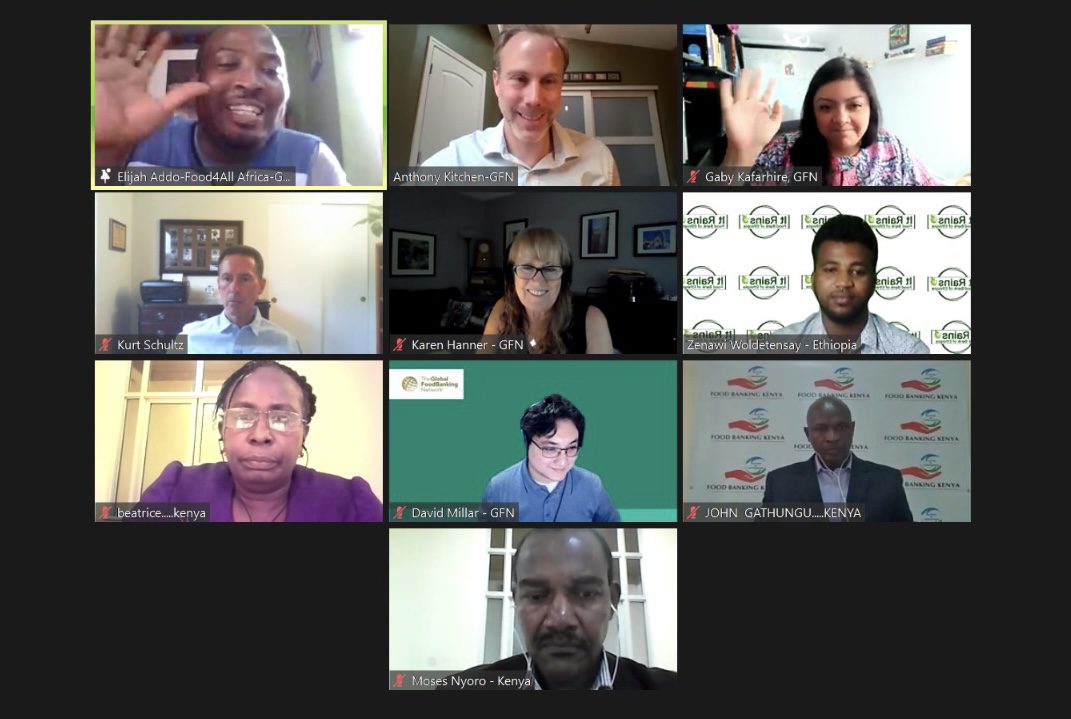Running a food bank is no simple operation: staff juggle many responsibilities, from procuring food and forming partnerships to navigating supply chain logistics and raising funds—and so much more. To accomplish all of this, food bankers need access to resources to stay up to date with the industry.
In August, The Global FoodBanking Network (GFN) launched a pilot to give food bankers a platform to more easily collaborate and learn from each other. To accomplish this goal of peer-to-peer learning, the Knowledge Networks were established: virtual platforms for food bankers to share their expertise and experiences using online forums, webinars, and other activities. The pilot Knowledge Networks are focused on food banks in the Latin American region.
“We asked member food banks what they needed from GFN as they move forward in a world impacted by COVID-19,” said Ana Catalina Suarez Peña, GFN’s regional director in Latin America. “The most requested service was an accessible way to learn and share information with other food banks so they can operate more efficiently and reach more people [facing hunger].”
The Latin America Knowledge Networks virtually gather food bank staff to share expertise and past experiences on topics like logistics, product sourcing, data management, and child feeding programs. Each topic is facilitated by a GFN staff member who specializes in that field. Since its launch, over 333 people from 17 countries have attended Knowledge Network virtual meetings.

The Knowledge Networks not only serve as a creative solution to the in-person gathering limitations resulting from COVID-19, but they are also a unique method of providing technical assistance due to their inclusivity of all food bank employees, from the executive directors to associate staff. “Throughout our conversations with our members, it was clear that we needed to involve as many people as possible [beyond senior management] to share information and expertise,” said Alfredo Kasdorf, regional consultant to GFN in Latin America. “The Knowledge Networks facilitate a greater depth of networking between experienced and developing food banks and leaders.”
Another success of the Knowledge Networks is the ease of communication between food banks and with GFN staff. This is made possible by an online collaboration tool where food bankers can post questions, discuss their organization’s activities, or share current events and news. Members have been highly engaged and express their enthusiasm for this tool to facilitate peer-to-peer learning.
“Through the Knowledge Networks, I’ve met people who work in my field,” said Carol Mérida, manager of donations and new projects for Desarrollo en Movimiento, the newest GFN member food bank in Latin America, located in Guatemala. “The greatest value I see in the Knowledge Networks is the many innovative solutions that have come out of generating ideas with peers, and how these solutions can be adapted for different situations.”

Through dialogue with other food bank staff in the Product Sourcing Knowledge Network, Mérida learned a strategy to extend the shelf life for a product her food bank receives.
“In Mexico, they use machines to make tortillas with surplus corn flour,” Mérida said. “One of the communities we serve told us they use the green bananas we distribute to make tortillas—so we are looking to implement [Banco de Alimentos de México’s] strategy and make banana flour with some of the 30,000 kilos of green bananas that are donated to us each month. Since bananas can ripen quickly or go bad, it will be great to distribute a more shelf-stable product like banana flour in our food kits.”
It’s only been two months since the launch of the inaugural Knowledge Networks in Latin America, but the initiative is already advancing the efforts of member food banks and enhancing the support provided by GFN. As food bankers collaborate and learn from each other, GFN staff, and other partners, they will serve their communities in even more effective ways. GFN looks forward to collaborating with local leaders to strengthen the resiliency of food banks across Latin America and beyond.
